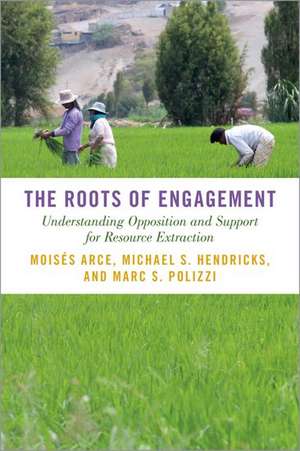The Roots of Engagement: Understanding Opposition and Support for Resource Extraction: STUDIES COMPAR ENERGY ENVIRON POL SERIES
Autor Moisés Arce, Michael S. Hendricks, Marc S. Polizzien Limba Engleză Hardback – 21 dec 2022
Preț: 490.92 lei
Preț vechi: 544.11 lei
-10% Nou
Puncte Express: 736
Preț estimativ în valută:
93.94€ • 98.33$ • 78.19£
93.94€ • 98.33$ • 78.19£
Carte disponibilă
Livrare economică 26 februarie-04 martie
Preluare comenzi: 021 569.72.76
Specificații
ISBN-13: 9780197639672
ISBN-10: 0197639674
Pagini: 216
Dimensiuni: 238 x 163 x 19 mm
Greutate: 0.45 kg
Editura: Oxford University Press
Colecția OUP USA
Seria STUDIES COMPAR ENERGY ENVIRON POL SERIES
Locul publicării:New York, United States
ISBN-10: 0197639674
Pagini: 216
Dimensiuni: 238 x 163 x 19 mm
Greutate: 0.45 kg
Editura: Oxford University Press
Colecția OUP USA
Seria STUDIES COMPAR ENERGY ENVIRON POL SERIES
Locul publicării:New York, United States
Recenzii
This book provides a novel perspective to the study of the conflicts that surround resource extraction. The authors offer a novel hypothesis to explain individual views that focuses attention on how participation in social organizations shapes preferences. As one of the first books to make extensive use of polling in the study of extractive conflicts, it contributes unique evidence. All scholars interested in the politics of natural resources should read this book.
Arce, Hendricks, and Polizzi have crafted an important contribution to our understanding of the dynamics of extractive conflicts. They bring much-needed attention to the lives of ordinary people who live near mining areas, exploring how people are affected and how they make up their minds about a project. Combining original surveys with fieldwork, this book is a great example of mixed-methods research. I am delighted to see this kind of work joining the conversation on extractive conflicts and can't wait to assign it in my classes.
The opposition of communities to extractive projects is now a familiar story. This fascinating book takes us inside those stories in a highly original way, focusing on individuals in the community and the micro politics of how their attitudes are formed, so that one accepts while another rejects the project. The claim that it is socially engaged citizens who are more likely to gain the knowledge and confidence to challenge a project that disrupts their communities is both theoretically elegant and empirically persuasive.
The Roots of Engagement tackles seminal questions in the field of resource conflict. Offering a fresh take on the debate about who participates and why, the authors shift the unit of analysis to the individual level, where decisions about participation can be analyzed more precisely. This book should be read by everyone who wants to make sense of extractive sector struggles.
Arce, Hendricks, and Polizzi have crafted an important contribution to our understanding of the dynamics of extractive conflicts. They bring much-needed attention to the lives of ordinary people who live near mining areas, exploring how people are affected and how they make up their minds about a project. Combining original surveys with fieldwork, this book is a great example of mixed-methods research. I am delighted to see this kind of work joining the conversation on extractive conflicts and can't wait to assign it in my classes.
The opposition of communities to extractive projects is now a familiar story. This fascinating book takes us inside those stories in a highly original way, focusing on individuals in the community and the micro politics of how their attitudes are formed, so that one accepts while another rejects the project. The claim that it is socially engaged citizens who are more likely to gain the knowledge and confidence to challenge a project that disrupts their communities is both theoretically elegant and empirically persuasive.
The Roots of Engagement tackles seminal questions in the field of resource conflict. Offering a fresh take on the debate about who participates and why, the authors shift the unit of analysis to the individual level, where decisions about participation can be analyzed more precisely. This book should be read by everyone who wants to make sense of extractive sector struggles.
Notă biografică
Moisés Arce is the Scott and Marjorie Cowen Chair in Latin American Social Sciences and Professor in the Department of Political Science at Tulane University. He specializes in conflict processes, state-society relations, and the politics of social and economic development. He is the author of Market Reform in Society, Resource Extraction and Protest in Peru, Protest and Democracy (with Roberta Rice), and numerous book chapters and journal articles. His research has been funded by grants from the National Science Foundation and the Social Science Research Council.Michael S. Hendricks is an Assistant Professor in the Department of Politics and Government at Illinois State University. His areas of research include resource extraction and peacekeeping. He has published articles in Research & Politics, International Studies Quarterly, and Latin American Perspectives.Marc S. Polizzi is an Associate Professor in the Department of Political Science and Sociologyat Murray State University. He conducts research in the areas of human rights, social movements, and transitional justice. He has published articles in International Studies Quarterly, The Extractive Industries and Society, and the Journal of Development Studies, as well as additional book chapters.



